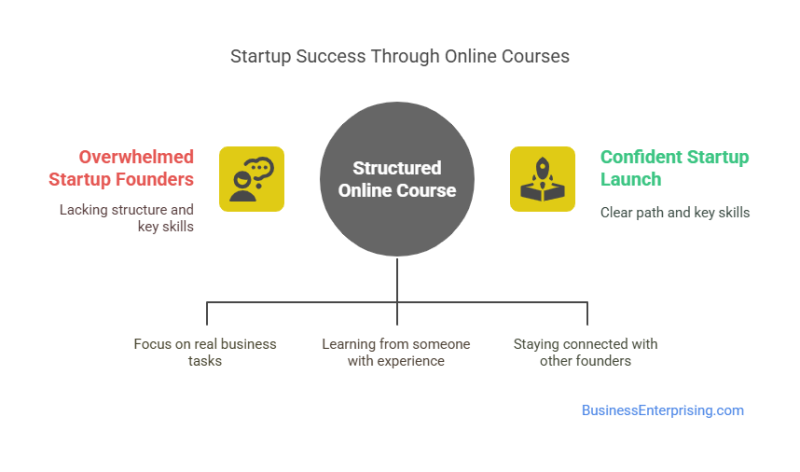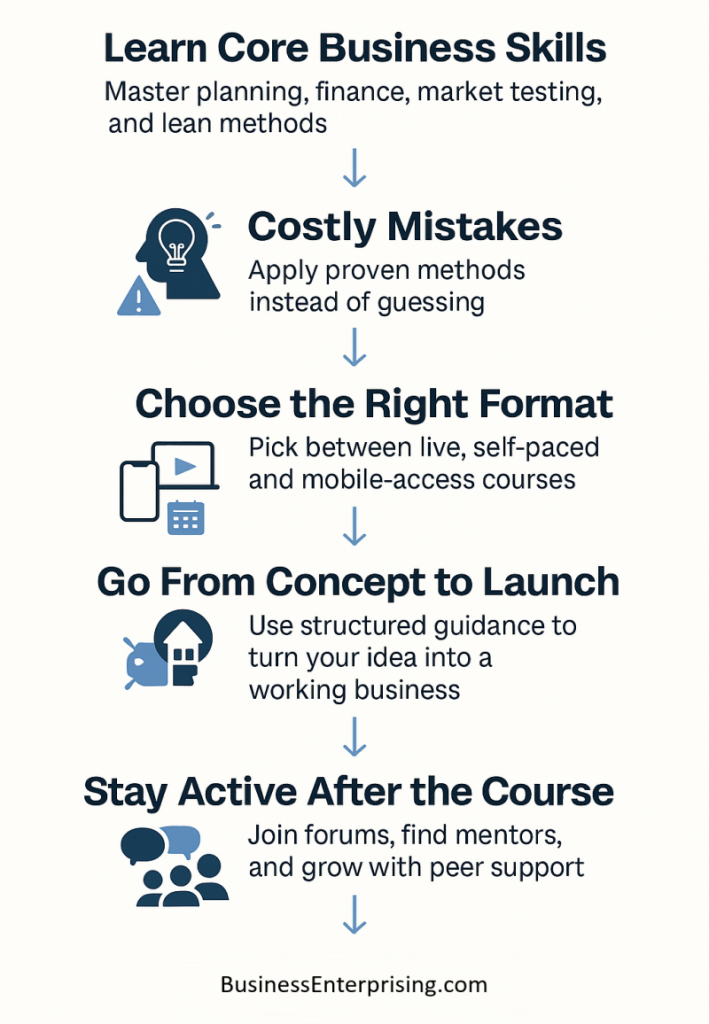
Additionally, these courses give you the basics without requiring a business degree. You learn how to plan, test, and build with purpose. Many founders struggle early on because they miss key steps. However, a structured course helps you avoid that pattern by teaching you what matters most.
You also benefit from learning at your own pace. That flexibility matters when you already have a full schedule. Therefore, the course fits around your time instead of forcing you to adjust everything. You stay in control while gaining real knowledge that helps your business move forward.
Many new entrepreneurs feel stuck because they don’t know where to focus. A good course narrows your attention to what gets results. Additionally, it helps you avoid mistakes that slow progress or waste money. That clarity saves you time and gives you direction.
You don’t need to do everything alone. With the right support, you move faster and with more confidence. A course that teaches the right skills early can make all the difference. It gives you a better shot at launching something that lasts.
Core Skills Every Startup Founder Must Learn
Startup founders need a few key skills to build and run a business that lasts. Business planning comes first. You must know how to map your goals and outline how to reach them. Without a clear plan, your daily actions can lose focus fast. This is where an online course for startup entrepreneurs can help guide your efforts.
Additionally, financial literacy matters from day one. You should understand cash flow, profit margins, and budgeting. These are not advanced topics. They’re basic tools that help you make sound decisions. You don’t need to be an accountant, but you do need to read financial statements. Otherwise, you risk running out of money without warning.
Market validation is another skill that supports your success. Many businesses fail because they build something nobody wants. By testing your ideas early, you avoid that trap. You learn what people need before spending time and money. That kind of feedback shapes your product and pricing.
Therefore, understanding lean startup methodology helps you stay flexible. This method keeps you focused on learning, testing, and adjusting as you go. Instead of guessing, you try small experiments. This saves time and lets you improve faster. The goal is to create something that works, not something perfect on the first try.
As you grow your business, these skills become even more useful. They support everything from marketing to hiring. Learning them early gives you a strong foundation. You don’t need years of experience, but you do need the right approach. A good course can help you build these skills without wasting time.
How Online Courses Bridge the Knowledge Gap for First-Time Entrepreneurs
Starting a business involves decisions that can lead to expensive mistakes. Many new founders try to figure things out alone. That often results in wasted time and money. However, a structured learning path can help you avoid those problems early.
An online course for startup entrepreneurs provides step-by-step guidance. It shows you what matters and what doesn’t. You get a clear overview of what to do and when to do it. That type of structure helps you focus on action instead of guesswork. Without it, you may skip steps or make poor choices based on limited knowledge.
Additionally, courses often explain common startup challenges before you face them. This prepares you to respond quickly when issues come up. For example, learning how to test a business idea saves you from building something no one wants. It’s easier to adjust your direction when you know what to expect.
Therefore, online learning reduces trial-and-error during the early stages. That doesn’t mean you’ll avoid every mistake. But it does mean fewer costly ones. You still build your own experience. You just don’t have to start from scratch or repeat other people’s failures.
Many courses also include exercises and examples you can use right away. These tools speed up your understanding. You’ll waste less time trying to find answers through random searches. Instead, you can spend more time building something that works.
With consistent effort, you can absorb what you need without feeling overwhelmed. A structured course helps you stay on track and keep momentum. You won’t know everything by the end, but you’ll know enough to move forward with confidence.
Choosing the Right Online Course: What to Look For
Not all online courses are worth your time or money. Some offer real value. Others only give you surface-level content. You need to choose wisely. A strong course gives you tools you can actually use. It also lines up with the goals you have for your business.
Start by looking at the curriculum. It should be clear, organized, and focused on real business tasks. If it’s full of filler or vague lessons, move on. You want direct teaching that helps you act, not theory that’s hard to apply. A good online course for startup entrepreneurs keeps things practical and relevant.
Additionally, check the instructor’s background. Who’s teaching the course matters. If they haven’t built or run a business, their advice may lack depth. Look for someone with experience, not just a title. That way, you’re learning from someone who has been through the process.
Therefore, reviews can give you insight into the course’s real impact. Don’t focus only on high ratings. Read what people say about results. Did the course help them launch or grow something? Or did they feel like it missed the mark?
Make sure the course also fits where you are right now. If you’re early in your business, avoid advanced content. If you already have traction, pick a course that builds on what you know. Your time is limited, so choose something that matches your current needs.
With the right fit, a course can support your growth without wasting time. Focus on structure, credibility, and outcomes. That’s how you pick something that actually helps your business move forward.
Real-World Benefits: From Idea to Launch Through Online Education
Turning an idea into a real business often feels unclear at first. Many founders don’t know what steps to take. However, an online course can give you a clear path forward. You move from guessing to taking action with purpose.
Take someone with a food product idea. Through an online course, they learned how to validate demand before production. They built a simple test site and offered samples. The course walked them through product pricing and packaging, which helped them avoid big mistakes. By launch, they had early customers and working systems.
Another example is a freelance designer who wanted to start an agency. They used a course to build a business model and set up contracts. Additionally, they learned how to manage client expectations and protect cash flow. Within months, they were operating full-time with paid clients.
These outcomes came from applying structured learning to real goals. You don’t need years of trial and error. With the right course, you can skip common startup errors. A reliable online course for startup entrepreneurs helps you move faster and smarter.
Therefore, online learning shortens the time between idea and launch. It breaks down complex tasks into steps you can handle. This makes your progress feel steady and manageable.
As you apply what you learn, your business becomes more real each week. You stop spinning your wheels and start building. With clear instruction and examples, courses make the startup process less scattered. Your idea deserves a real shot. Online education helps you give it one.
Flexible Learning for Busy Founders: Why Format Matters
Startup founders rarely have extra time. Between product development, sales, and operations, your days fill up fast. However, flexible learning formats let you build knowledge without disrupting your schedule. That’s why course format matters more than you might think.
Asynchronous content allows you to learn on your own time. You can pause lessons and come back when needed. This format works well if your daily routine changes often. Additionally, it gives you space to absorb concepts at your own pace. That keeps learning practical instead of overwhelming.
Live formats offer real-time feedback and interaction. However, they can feel restrictive if your calendar stays full. Many busy founders miss sessions or lose focus during long live calls. Therefore, a course that offers replays or recordings can give you the best of both.
Self-paced modules add even more control. You decide how much time to spend each week. This helps you stay consistent without pressure. It also improves retention. You’re more likely to remember content when you learn it in smaller blocks.
Additionally, mobile access makes learning easier during short breaks. You can study during a commute or between meetings. A strong online course for startup entrepreneurs works across devices. That way, you don’t feel tied to a desktop or fixed schedule.
Course format impacts how well you stick with it. With the right setup, you’re more likely to finish and apply what you learn. Focus on options that match your routine and give you room to stay engaged. That kind of flexibility helps you move forward without falling behind.
Beyond the Course: How to Leverage Online Learning Communities and Mentorship
Finishing a course is only one step in building a business. What you do afterward matters even more. However, many founders stop once the lessons end. That’s a missed opportunity. You can learn more by staying connected to others who took the same course.
Most programs offer access to forums or alumni groups. These spaces let you ask questions and share ideas. Additionally, they expose you to people solving similar problems. That support helps you stay focused when challenges come up. You don’t need to solve everything alone.
Peer accountability can also push you to follow through. When others track their progress, you feel more motivated to do the same. Therefore, showing up regularly and staying engaged with others builds strong habits. This kind of rhythm supports steady growth over time.
Some courses also connect you with mentors. These are often past students or instructors who want to help. A mentor can review your ideas, offer feedback, or flag blind spots. Additionally, they give you a broader view of what to expect as your business grows.
An online course for startup entrepreneurs becomes more valuable when you stay active in the learning community. You continue learning after the content ends. This keeps your skills sharp and your mindset focused. You may also find partners, referrals, or tools that speed up your progress.
Learning doesn’t stop with the final module. You gain more when you apply the lessons with others. That shared learning makes it easier to build something that lasts.
Conclusion
Learning to start a business takes time, focus, and practical guidance. You don’t need to figure out everything by yourself. However, scattered advice can slow you down or lead you off track. A structured approach helps you stay focused and productive from the beginning.
An online course for startup entrepreneurs gives you more than theory. It shows you how to take real steps that move you forward. Additionally, it connects you with people who share your goals and challenges. That support can make all the difference when things get difficult.
Therefore, the right course can help you launch with less guesswork. You learn from mistakes others already made. You also gain tools that help you plan better, test ideas, and make decisions with confidence.
As you apply what you’ve learned, you’ll see progress in clear ways. Your idea turns into something real and workable. That kind of clarity keeps you moving even when results feel slow. With time, you build momentum that carries your business forward.
Additionally, staying active in learning communities helps you keep growing. You don’t have to be the smartest person in the room. You only need to keep learning, adjusting, and taking small, smart steps.
If you want a way to move from concept to action, start with the right tools. A solid course can help guide that process and support your long-term growth. That’s how small wins turn into real progress—one focused step at a time.



